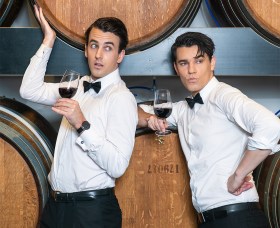Benjamin Northey, Associate Conductor, Melbourne Symphony Orchestra; photo by Matt Irwin.
To outsiders, the conductor’s role looks relatively uncomplicated: stand on a podium and wave a baton around. In reality, the conductor’s role is deeply complex: not only must they be able to read multiple scores simultaneously and be knowledgeable about a wide range of composers and their works but they must also be capable of communicating the emotional intensity of a piece of music by directing an orchestra or ensemble’s tone, articulation, tempo, intonation, and phrasing.
Resident conductors may also have to select repertoire, give interviews, and manage the temperaments of soloists and performers.
But how does one become a conductor – and is there any such thing as a typical day on the job?
‘Whilst I was completely drawn to music from a very early age, conducting became a focus only after I had spent a decade as a working musician. I had led some ensembles at various times, usually by necessity, but it wasn’t until my undergraduate honours year at university that I took the serious plunge into conducting studies at the urging of the great John Hopkins. Once I got the bug I never looked back,’ said Benjamin Northey, Associate Conductor, Melbourne Symphony Orchestra and Chief Conductor, Christchurch Symphony Orchestra.
Assistant Conductor at the Sydney Symphony Orchestra, Toby Thatcher, describes a similar career path.
‘The craft of a conductor is something that interested me from an early age, and as an orchestral musician I spent time with scores, watching the various conductors I worked with, judging what did or didn’t work,’ he told ArtsHub.
‘The creative process in general is something I find entirely enthralling, and conducting felt like a way into the core of this process. That’s not to dismiss the ability for instrumentalists to also deeply investigate music, and I quite often miss playing oboe in orchestras or chamber groups. However watching the greats provide a space where musicians can perform at their best is a thrill and obsession.
‘There was an extended period during study while I was maintaining both oboe and conducting, but the job with the Sydney Symphony Orchestra meant I had to specialise, and conducting took over. I haven’t regretted the decision once, and can’t wait for each next opportunity to make or learn more about music.’ Thatcher added.

Argentinean conductor, pianist and classical singer Anna Castro Grinstein
Young Argentinian conductor Anna Castro Grinstein, a former student at the Australian National Academy of Music (ANAM), also began studying music – first the piano, then singing – as child, but it wasn’t until she attended several rehearsals of a production of Carmen as a teenager that the music bug truly bit.
‘That was probably when I started to feel really intrigued by the sound of orchestras and the world of opera. I began frequenting more and more performances and rehearsals, and by the time I was finishing high school I had already decided that I wanted to take up conducting studies,’ she said.
Formal training vs on the job
Unfortunately for Australians wishing to embark on a conducting career, there are few formal training options in Australia, according to Thatcher: ‘There is a course at the Sydney Conservatorium of Music, and up until this year Symphony Services offered a terrific program in which I participated for two years while an undergraduate. It’s tremendously sad that this has been discontinued.
‘As we speak there is a tremendous pool of young Australians around the world showing promise and ability as conductors, most of whom participated in the course. At least three of the state orchestras have Assistant Conductor positions, however in order to reach that point the onus is on young conductors to make opportunities for themselves, and seek out people to advise and teach them. For at least a part of a conductor’s training, you can’t improve on the process of organising your own opportunities, understanding different levels of the process, and making music with friends and colleagues,’ he said
Northey chipped in: ‘There are postgraduate courses in Melbourne and Sydney, also a new one starting in Adelaide by my college Luke Dollman. There are often smaller intensive masterclasses which are good experience. The Symphony Australia Conductor Development Program was a world leader and has produced a generation of highly successful Australian conductors. But the best training is in the doing, it’s about opportunity.’
A day in the life

SSO Assistant Conductor Toby Thatcher; photo by Christie Brewster
Thatcher advocates starting the day with exercise – in his case, swimming. ‘Within the past year I’ve discovered it as a means to clear and focus my mind, and replace a couple of necessary coffees. Karajan walked daily, for much the same reasons, and I’m beginning to understand why. Despite regularly being lapped by people four times my age, I’m greatly enjoying it as a part of my routine,’ he said.
‘Honestly though I’m not sure anything is hugely typical in my schedule, which is exciting! There are certainly elements which currently occur daily; coffee drinking, score study, German study, reading, various admin work, lengthy adventures through the wonders of YouTube. I’m currently split between time in Sydney working as the Assistant Conductor with the Sydney Symphony Orchestra, and living in London where I am the founder of one group (Ensemble Eroica) and founding member of another (Ensemble x.y). I’m constantly striving to build these organisations into tools for young musicians to showcase their ability and gain experience and opportunities. Working on seeking out opportunities for the groups, and corresponding with various people, is definitely daily work,’ Thatcher added.
Grinstein’s routine depends on her current workload and commitments. ‘There are times where there is a lot of rehearsing and working with the orchestra or ensemble in question. This can be followed by quieter times, but in any case there is always some amount of studying in the mix. You always have to set aside time for studying. This can be score preparation for an upcoming project, or general repertoire studies. And it never really stops, since even highly experienced conductors that have performed pieces several times throughout their careers always go back to the score and find new challenges, interpretation possibilities, and so on.’
Northey described his typical day as being divided between preparation and application.
‘When I’m in an orchestral week for example I usually rehearse with the orchestra for 12 ½ hours over three days before the concerts. Usually these weeks are Wednesday-Saturday but it varies a lot. Some programs have much less rehearsal time and require a different approach. When I’m not conducting I’m usually preparing for future programs. I have a studio at home where I spend many hours studying and working on scores. There is no real typical day actually. I never really stop thinking about music. And I am on planes and in hotels a lot… it’s a travelling profession that’s for sure,’ he said.
Highlights and lowlights
‘Studying at the Royal Academy was a life-changing experience. The general aura of the place, and the calibre of musicians both in the student body but also the guests, teachers and performers, was immense. It led to opportunities to tour, rehearse and perform with the Philharmonia, Royal Philharmonic and Sinfonietta in London,’ said Thatcher.
‘Performing La Boheme in Paris with the Royal Philharmonic, and Mahler’s 8th Symphony at the Royal Festival Hall with the Philharmonia, are two immense highlights of my oboe life. A European tour with the Australian Youth Orchestra was another thrilling opportunity.
‘In conducting terms, conducting Strauss in the final of the Georg Solti Conducting Competition in Frankfurt, almost every opportunity to date as Assistant Conductor with the Sydney Symphony Orchestra, and a chance to conduct Ensemble Modern are possibly towards the top of the pecking order as a conductor. Chances to meet and converse with heroes of mine, including Christoph von Dohnányi, Sir Mark Elder, Semyon Bychkov, David Robertson Paavo Järvi and Vladimir Jurowski have provided me with the best opportunities to learn I could ask for,’ he said.

Benjamin Northey photographed by Matt Irwin
Northey acknowledged that any working life has high points and low points.
‘Having said that, any challenges along the way have been comprehensively outweighed by the overwhelming number of inspirational experiences I’ve had as a conductor. Winning the 2001 Symphony Australia Young Conductor of the Year was pivotal, winning a place at the Sibelius Academy after a two-day audition is something I’m very proud of. My first professional engagement with the Melbourne Symphony Orchestra in 2003 was unforgettable as was conducting the London Philharmonic for the first time,’ he explained.
‘And now being Chief Conductor of the Christchurch Symphony has opened up a new world of possibilities. It seems unfair to single anything out though – each project has highlights and I’m constantly in awe of the artistry and creativity the musicians bring to the work.’
Sometimes a career highlight can be as simple as working closely with friends and colleagues to realise a project, said Grinstein.
‘Last year I organised a concert with a wonderful group of young musicians in a self-managed manner. Everyone got involved because of their interest in the piece in question (it was a work by Ginastera) and communal music making, since we did not have external funding. It meant that I had to take care of many organisational aspects of the project, which introduced me to another aspect of a conductor’s responsibilities. It was a great joy to see the concert realised,’ she told ArtsHub.
Advice for aspiring conductors
Thatcher is quick to encourage anyone with an interest in conducting. ‘Never turn down an opportunity, always ask people you admire for time, go out of your way to work the hardest you can, and then learn the way in which you learn best. You can only learn this by pushing yourself too far, and finding that limit, making those mistakes,’ he said.
‘I’m constantly amazed by the reluctance of young people to approach people in the profession and ask them questions. Perhaps I’m missing something crucial, but I can’t see a single reason not to ask. I undoubtedly have asked my fair share of silly questions, or laid bare my ignorance on subjects I should know more about, but invariably I learn more about conducting, music, working with people, mentality etc from asking experienced and excellent musicians than from anywhere else.’
Greinstein’s advice for would be conductors is, ‘Keeping the focus on the music and preparing as much as possible for whichever work you may be approaching. I would also advice to always make music as an instrumentalist (specially chamber music) and to observe as many orchestra rehearsals as you can, they are an invaluable source for learning.’
Northey was also forthcoming on the subject, but succinct. ‘Work, work, work,’ he said. ‘Be respectful of people. Don’t be easily satisfied. Only commit yourself to conducting if you can’t imagine your life without it. And finally, try to forget yourself.’
Previous stories in this series:
Career Spotlight: Puppeteer
Career spotlight: Art therapist
Career spotlight: Playwright
Career spotlight: Stage manager
Career spotlight: Conservator
Career spotlight: Costume designer
Career spotlight: Contemporary jeweller
Career spotlight: Floral artist





